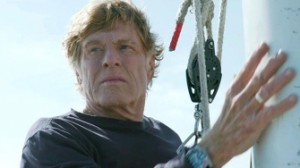All Is Lost
All Is Lost, 2013, 3 ½ stars
All Is Lost charts true course
Robert Redford finds his way into our hearts yet again
 From The Orlando Weekly, November 6, 2013
From The Orlando Weekly, November 6, 2013
As empathetic creatures, we’re moved when we see an unknown man suffering. Nevertheless, as self-centered beings, we’re moved even more when we know the man, as All Is Lost proves, because the man is Robert Redford, an icon we’ve lived with for more than 50 years.
It’s that sense of familiarity and kinship that elevates writer-director J.C. Chandor’s new film above a level one might expect. After all, it’s really just 106 minutes of a man stranded at sea, with almost no dialogue or exposition. Yes, it’s shot, edited and scored well – with minimal embellishments, limited CGI and hyper-realistic handheld camera befitting its subject – but this is no breathtaking depiction of the open sea like we saw in Life of Pi or Kon-Tiki, or a dramatic spectacle on the scale of Gravity. It’s just humanity at its most basic.
Redford plays “our man,” a nameless, story-less character sailing his small yacht, the Virginia Jean, in the middle of the Indian Ocean. (When’s the last time the only named character in a film was an inanimate object?) After a freak collision with an adrift shipping container punctures and partially floods his boat, rendering it and most of its equipment essentially useless, the man must summon all his ingenuity and resolve, plus a lot of luck, if he is to live.
Because the only detail we know of the man is that he has a family, Redford’s character becomes not a fictional character, but Redford himself. Except for the fact that the real Redford admits he’s not adept at sailing, this really could be the 77-year-old actor out there. And although his performance is solid, it’s not so much his acting that sells the tale – it’s Redford’s simple existence in the world of a well-crafted, though somewhat slight, film. The emotional impact is undoubtedly akin to what French audiences felt while watching screen legend Jean-Louis Trintignant cope with tragedy in Amour.
Redford’s character shows great courage and calm during his ordeal, but the real medal for bravery should go to Chandor, who, in just his second directorial outing, has fashioned a quiet, contemplative and shockingly unconventional adventure-drama, complete with intriguing ambiguity. Most surprising is the 180-degree turn the director has made from his first film, Margin Call. While that tense drama about the 2008 financial collapse contained clusters of characters, All is Lost contains just one. And the abundant dialogue of Chandor’s debut has also disappeared, replaced with Redford’s brief opening monologue before setting sail into virtual silence.
Though the plot details are quite different, All Is Lost begs comparison to Robert Zemeckis’s Cast Away. That earlier film was more gripping and Tom Hanks’ performance stronger, but, nevertheless, the two films feel aesthetically and psychologically joined. They are both simple but moving stories of the struggle to survive against odds that most of us will never face.
© 2013 Orlando Weekly / MeierMovies, LLC